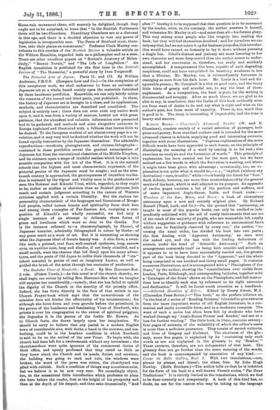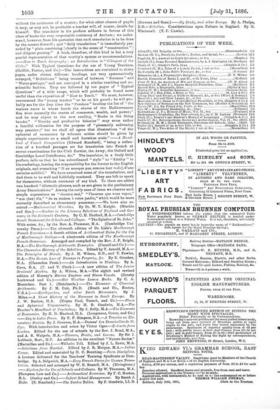SCHOOL BOOKS. — Chambers's Advanced Reader (W. and 13. Chambers),
consists mainly of a varied selection of passages, both prose and poetry, from standard authors, and is intended for the more advanced classes in schools, supplying good and interesting extracts, together with some illustrations. "Copious explanations of the more difficult words have been appended to each lesson, on the principle of illustrating the meaning of a word by tracing it to its root ; also exercises on analysis and the formation of words." This principle of explanation has been carried out for the most part, but we have noticed not a few words in which the derivation is wanting, and where it might have been given with advantage ; occasionally, too, an ex- planation is not quite what it should be,—e.g., "implicit (without any derivation) = sure, trustful ;" while tetra is hardly the Greek for "four." Such defects, however, are more than counterbalanced by the general merits of the book, which is well adapted to its purpose. An appendix of twelve pages contains a list of the prefixes and suffixes, and of some important Anglo-Saxon, Latin, and Greek roots.— Wonders of the Sun, Moon, and Stars ; a book of elementary astronomy upon a new and entirely original plan. By Richard Russell (Ward, Lock, and Co.)—On the ground that "astronomy, as taught in most of the popular books, can only be verified or inde- pendently criticised with the aid of costly instruments that are out of the reach of the majority of pupils, who are meanwhile left totally without suggestion or guidance with reference to astronomical facts which can be familiarly observed by every one," the author, "re- versing the usual order, has divided his book into two parts ; the first dealing with Apparent Astronomy,' as seen with the naked eye, and the last with the leading deductions of science, under the head of Scientific Astronomy." Such an arrangement commends itself as being both sensible and scientific ; it appears to us to have been successfully carried out, the greater part of the book being devoted to the "Apparent," and the whole being comprised in one hundred and thirty small pages. It contains numerous illustrations, and is accompanied with a" Planisphere of the Stars," by the author, showing the "constellations over visible from London, Paris, Edinburgh, and corresponding latitudes, together with a Catalogue of the Stars' shown on the Planisphere, and fall instrac Lions how to identify each star by reference to its right ascension and declination." It will be found worth attention as a handbook. —Selected Homilies of ZElfric. Edited by Henry Sweet, M.A. (Clarendon Press Series.)—" This book," as the preface informs us, "is the first of a series of Reading Primers,' intended to give extracts from the more important works of old English literature, in a con- venient and easily accessible form, and in a moderate compass. The want of such a series has often been felt by students who have worked through my Anglo-Saxon Primer and Reader,' and are at a loss for farther reading." The little book, in 18mo, contains seventy- four pages of extracts, of the suitability of which the editor's name is more than a sufficient guarantee. They consist of sacred subjects, and lives of Gregory and Cuthbert. The shortness of the glor- sary, some five pages, is explained by its "containing only each words as are not explained in the glossary to my 'Reader." These extracts, therefore, are not independent of that book. The glossary does not go further than the mere meaning of the words, and the book is unaccompanied by annotation of any kind.— Cesar de Bello Gallic°, Book I. With two translations,—one, phrase by phrase, and literal ; the other, free. By John Hugh Hawley. (Relfe Brothers.)—The author tells us that he is indebted for the form of his book to a well-known French series, "Par Deux Traductions." It is strictly limited to the translations, which we find to be done correctly and competently. A book of this kind has, no doubt, its use for the learner who may be taking tip the language without the assistance of a master ; for what other classes of pupils it may, or may not, be profitable a teacher will, of course, decide for himself. The translator in his preface addnoes in favour of this Class of books the very respectable testimony of Ascham ; we under. stand, however, from his quotation that such translation is to be done by the master himself ; and "daily translations" is immediately pre- ceded by "plain construing [clearly in the sense of "construction "] and diligent parsing." A book, therefore, of this kind is but a very partial representation of that worthy's system or recommendations. —How to Teach Geography : an Introduction to "Glimpses of the Globe." With Typical Questions for the use of Young Teachers. (Griffith, Fenno, and Co.)—The instructions are contained in thirty pages, under eleven different headings, not very systematically arranged, " Definitions " being treated of between " Streams " and "Water-partings," and are conveyed in a similar rambling and un- scientific fashion. They are followed by ten pages of " Typical Questions" of a wide range, which will probably be found more useful than the exposition of "How to Teach." We must, however, recommend the "young teacher" to be on his guard ; he will pro- bably see for the first time the " Persians " heading the list of "the various races in whose hands the shores of the Mediterranean Sea were naturally the centre of commerce, wealth, and power;" mud he may object to the new reading, "Books in the living brooks." "Wrecks and productive fisheries" may seem rather a fanciful collocation for the purpose of "pleasantly enlivening map practice ;" but we shall all agree that illustrations "of the upheaval of mountains by volcanic action should be given by simple experiments on a small and harmless scale."—A Hand- book of French Composition (Edward Stanford), "being a collec- tion of a hundred passages set for translation into French at recent examinations for the Civil Service, the Army, the Oxford and Cambridge Local Certificates, ecc." The translator, in a lively little preface, tells us that he has subordinated " style " to " fidelity " in his renderings, leaving the responsibility for the former to the English originals, and remarking "II no mancpae pas, comme leur rosbif, d'une certaine solidite." We have examined some of the translations, and find them to be well and faithfully rendered. They are left to speak for themselves, without comment of any kind. To them are added two hundred "idiomatic phrases, such as are given in the preliminary Army Examinations." Among the early ones of these we observe such simple expressions as " ecoutez moi," " l'homme qua vous voyez," "son (her) fils," "de sa maison ii votre jardin," which would be more correctly described as elementary grammar.—We have also re- ceived :—Mathematical Wrinkles. By Dr. W. T. Knight. (Blackie and Son.)—Studies in the Literary Relations of England and Ger- many in the Sixteenth Century. By C. II. Herford, MA.—Cambridge Greek Testament for Schools and Colleges. " TheEpietles of St. John." With notes, &c., by the Rev. A. Plummer, M.A. (Cambridge Uni- versity Press.)—The eleventh edition of De Lisle's Marlborough French Exercises.—A fourth edition of Arithmetical Rules for the Use of Marlborough College.—A nineteenth edition of The Marlborough French Grammar. Arranged and compiled by the Rev. J. F. Bright, M.A.—The Marlborough Arithmetic Examples. (Cassell and Co.)— The Clarendon History of the Rebellion. Edited by T. Arnold, M.A.- The Principles of Morals. By J. M. Wilson, BD., and T. Fowler, M.A.—The Roman Law of Damage to Property, 4,c. By E. Graeber, M.A. (Clarendon Press.)—An Introduction to Theology. By A. Cave, BA. (T. and T. Clark.)—A new edition of The Junior Students' Algebra. By A. Wilson, MA.—The eighth and revised edition of Murray's Marine Engines and Steam Vessels. (Crosby Lockwood and Co.)—Hot Weather Lesson Books. By C. A. Montresor. Part I. (Hatchards.)—The Elements of Chemical Arithmetic. By J. M. Coit, Ph.D. (Heath and Co., Boston, U.S.A.)—Earth quakes, and other Earth Movements. By J. Milne.—A Short History of the Normans in South Europe. By J. W. Barlow, M.A. (Kegan Paul, Trench, and Co.)—Plane and Spherical Trigonometry. By H. B. Goodwin, M.A.—The Teacher's Handbook of Psychology. By J. Sully, M.A.—The Elements of Economics. By H. D. Macleod, M.A. (Longmans, Green, and Co.) —Key to Latin Prose. By F. P. Simpson, BA.—A Treatise on Ele- mentary Statics. By J. Greaves, M.A.—Dumas' Les Demoiselles de St. Cyr. With introduction and notes by Victor Oger.—Krtracts from Lucian. Edited for the use of schools by the Rev. J. Bond, MA., and A. S. Walpole, M.A.—Flowers, Fruits, and Leaves. By Sir J. Lubbock, Bart., M.P. An addition to the excellent "Nature Series." (Macmillan and Co.)—Wilhelm Tell. Edited by J. L. Bevir, M.A. —Selections from Martial. Edited by J. R. Morgan, M.A.—Julius (hisser. Edited and annotated by H. C. Beeching.—Form Discipline. A Lecture delivered for the Teachers' Training Syndicate at Cam- bridge. By A. Sidgwick, M.A.—Easy French Pieces for Unseen Trans- lation. Selected and arranged by W. E. Russell, M.A. (Rivingtons.) —Algebra for the Use of Schools and Colleges. By W. Thomson, M.A. (Sampson Low and Co.)—Arithmetical Exercises. By F. C. Horton, BA. (Seeley and Co.)—Infant School Management. By Sarah J. Hale. (E. Stanford.)—The Twelve Tables. By F. Goodwin, LL.D. (Stevens and Sons.)—My Study, cold other Essays. By A. Phelps, D.D.—Echetlus. Considerations upon Culture in England. By G. Whetenall. (T. F. Unwin).



































 Previous page
Previous page